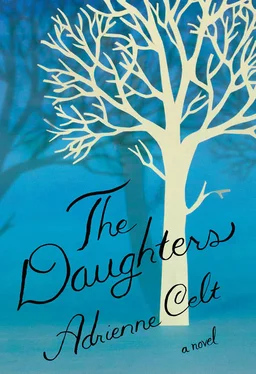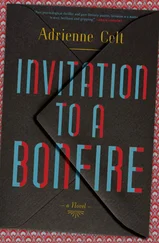St. Boniface Cemetery is surrounded by high walls, situated on the liminal edge between two neighborhoods — the wealthy one I’ve just passed through and the penniless one on the other side. In death they move closer and finally meet, the rich and poor alike. I stop when I reach the fence and rest my hand lightly against it, as if this were home base in some cosmic game of tag. I think of all the things Baba Ada saved me from, how close she hewed to me when I came to her crying after school or after a bad audition, any little injury. The cemetery is full of statues of saints, robed figures who peer out at me from their veils of stone and snow. I walk a few more paces to the gate, trying to ignore the nest of anxieties beneath my lungs.
I have no flowers after all, just a child half sleeping, but it’s Ada I’m here to see. She won’t be angry about something so petty. She’ll take me in her arms, put her hand to my cheek. That’s what she always used to do. Listen to my troubles. Tell me a story.
In the distance I hear some scratching, shuffling steps, but there’s no one in sight. Maybe it’s a stray dog, or a teenager avoiding school. The statues are perfectly silent, as statues tend to be. The snow has picked up, still wet, hitting hard against my skin, and I curl my fingers around one of the bars on the gate, the iron freezing even through my gloves. Somehow, I can’t bring myself to step inside. Ridiculous. What am I afraid of?
The saints, concrete and marble alike, stand still and wait for me, eyes hidden under hoods. I shiver and turn away.
All day I’ve been trying to save Kara, save myself from danger. A curse. The pressure of my secrets and fears building up inside me to a boiling point. Yet this is where I brought my child: not somewhere safe, but to a graveyard, a mausoleum. Maybe I hoped the silence would make me feel at home. This isn’t where my baba is, though, not really. Ada hated dead things. Or at least that was my impression. She would never talk about them as they really were. She had a taste for the living, or perhaps the living dead.
I remember. It was, after all, a taste I came to share.
A da earned our keep doing alterations at the Marshall Field’s annex store on East Washington. When she arrived in Chicago in 1938 it was a good job, better than doing tit and tat as a home seamstress, and certainly a vast improvement over anything connected to the city’s infamous slaughterhouses, where her cousin Freddie worked until they closed down or until he died — I’ve never been sure which.
To me the work at Marshall Field’s always seemed beneath my babenka , who herself wore clothes tailored to make her look like a lady, with precision pleats and hidden darts. None of the other women Ada worked with seemed to know who Greta was, and they took liberties with my baba that I didn’t think anyone had the right to: they laughed with her, they scolded her, sometimes they told her what to do.
Basia was my grandmother’s particular friend, the only one who ever came to our home. They drank tea out of our two good cups and generally chased me away to discuss “things a child wouldn’t understand.” So Basia put it.
Not long after the day Ada rescued me from my exile of painted nails, Basia sat in our kitchen listening to me go on about Greta’s powers. She turned to Ada and frowned.
“What nonsense are you filling this girl’s head with?”
I actually gasped, a terrible piece of theatricality.
“Oh, lalka .” Ada waved her hand at me. “Go to your room. Give us some time.”
“Baba—”
“Go on.” She set down her teacup. “I mean this.”
As I stalked out the door to what felt like another banishment, I heard her say to Basia: “. can’t know what she’ll make of it.”
Basia just laughed and said, “Well, it’s no better to hide.”
To which my baba said nothing at all.
What I didn’t understand was that Ada’s two sides — her dignified sense of style and her position as a day laborer; her self-assured domination over our home and her bonhomie at work — were quite inextricably linked. She was able to bring home clothes deemed beyond repair and work them over into sleek statement pieces for herself or else cut them down for my mother or me. And the women at Marshall Field’s — most of them immigrants too — provided a community that neither family nor church could give Ada when she first left Poznań.
Despite my certainty that my baba deserved better, the store still drew me with the childish appeal of a factory floor. I marveled at the fact that a bolt of cloth could become a pair of pressed slacks, that a tear could be mended into invisibility. And when they were all collected together, the seamstresses were a captive audience. Why they viewed me as a performer and my grandmother as nothing more than one of the girls , I couldn’t quite grasp. But it seemed to be what Ada wanted.
I was generally not allowed in the big back room where the women sat with lamps bent towards their handiwork, fingers running nimbly over bobbins, belts, and treadles. It was thought I would be in the way, and I was. On the few occasions Ada capitulated to my whining and snuck me along with her, I raced up and down the aisles between sewing machines and stood in the hallway singing “Amarilli, Mia Bella” until all foot pedals stopped and all hands applauded. Probably Ada and Basia prepared the rest of them for me, those women with their hair tied back, with their sensible dark eyes and occasional arthritic protrusions in their fingers. But as far as I knew they lived their lives there, bent over careful hemming and hypnotized by the constant grinding mumble of the machines. When I ran through the door — shoes making their slap-slap-slap against the floor — I pictured myself as a refreshing, avenging wind blowing misery and monotony out the window with my laughter.
After a song or, if I was lucky, two, Ada would give me a handful of Frango mints and tell me to go play quietly by myself. This was the hard part; I was not naturally still. But Ada told me it would be good practice for being a singer when I grew up: sometimes I would have a single aria nestled amid two full acts of opera. I would need to be able to wait in the wings for my moment of glory. That my taste for glory came from Ada too would not occur to me for some time.
The alteration room was on a floor that wasn’t open to the public. So when my fists were full of chocolates and I’d been dismissed from the sewing quarters, I was generally able to wander around the hall and find a place to sit all by myself. Any clothing waiting for the clever attention of Ada’s ladies was piled in a mountain of fabric in one room; women would come by as they completed projects and peel a new one from the stack, with instructions for hemming, mending, or taking in pinned to the front.
The finished clothing was treated with more reverence. Several of the rooms on the alteration floor were no more than giant walk-in closets with low lighting, as though they housed art that required preservation from the elements. Racks of suit jackets hung beside rows of starched blouses; wool skirts organized by length were suspended beside coats, which were trimmed with mink or rabbit depending on the price. One room was always reserved for wedding dresses sheathed in thin sheeting — the plastic muted the dresses’ blinding whiteness and made them glow as they might have in the light of the moon. Often the dresses swayed when I entered their lair; they looked very much like a cadre of sleeping ghosts all hung by the shoulders, effluvial tails dragging gently on the ground.
I dared myself to stay among them. It was a challenge: eat a pile of chocolates in a room of white clothing without leaving any fingerprints. Sit in a quavering pool of spirits without awakening one and raising its ire. I chose a point in the middle of the room and shuffled a few hangers aside to duck between so the plastic closed back around me when I leaned against the wall. I was afraid of the ghosts, but if I closed my eyes I could convince myself that the shushing sounds of the swaying dresses were really coming from leaves rustling together in the wind.
Читать дальше












